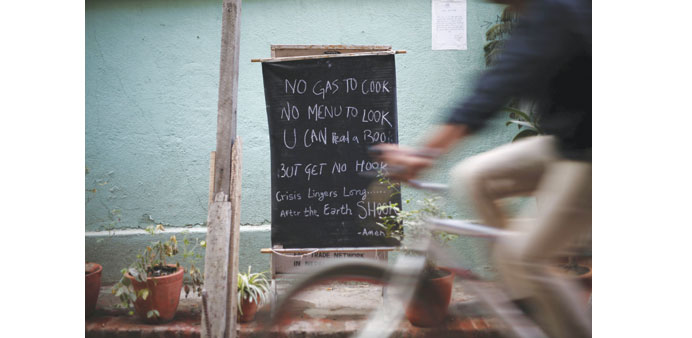A notice is displayed outside a restaurant as fuel crisis continues in Kathmandu yesterday.
Strikes, blockades and protests against Nepal’s new constitution have cost the economy more than $1bn, according to the Federation of Nepalese Chambers of Commerce and Industry (FNCCI) - just months after the country was struck by a series of devastating earthquakes.
Pashupati Murarka, the president of the FNCCI, described the crisis as the country’s worst economic disaster. “The economy has been almost completely stalled for the past two months,” Murarka said. “The impact is worse than the earthquake.”
Daily life in the Terai, the southern plains bordering India, has been paralysed for almost two months by a general strike called by political parties and organisations that oppose the new constitution. Schools and factories are shut, transport services have been severely disrupted, and the price of basic necessities has soared.
Murarka accused the government of Prime Minister Sushil Koirala of failing to address the crisis. “The government should have created an environment to ease the situation and ensure proper security to run businesses,” he said. “But the protesting political parties are equally responsible; who gave them the right to halt our work?”
The strike was ordered by political parties and organisations representing the region’s main ethnic groups - the Madhesi and Tharu - who are demanding greater representation in parliament and a redrawing of the provincial boundaries that were set out in the new constitution, which was finalised two weeks ago.
“We are very sad that people are facing difficulties (because of the protests) but … it’s because the government has turned a deaf ear to our demands … they have neglected the voice of more than half the population. This protest is to ensure their rights,” said Laxman Lal Karna, co-chairman of the Sadbhavana party, one of the parties working for the rights of the Madhesi community, among others. “The day the government addresses our demands, the protests will be withdrawn.”
At least 40 people, including children and several police, have died in violent demonstrations that began in August and escalated last month when protesters blocked the border entry points between Nepal and India , cutting off vital supplies, including petrol and cooking gas, to the landlocked country.
Government officials have claimed that India has been providing tacit support to the protesters, by refusing to let trucks enter Nepal, a charge that India rejects. A small number of trucks are now crossing the border into Nepal, but there is little sign of them in Kathmandu, where long queues for petrol wind through the city’s streets.
The government has banned private vehicles from refuelling, while petrol and diesel for public transport have been rationed. International flights to Kathmandu have been instructed to refuel elsewhere. The city’s usually chaotic streets are strangely calm as some residents turn to cycling or car-pooling to get around.
The blockade has hit traders, restaurant owners and taxi drivers particularly hard. Ramesh Rijal, a 20-year-old taxi driver who had been queueing hard for petrol for two days, said: “I should leave this job and go back to my village. I’m feeling so stressed. I have no money now, but the owner of this taxi is pressuring me to get petrol. It’s the government’s fault. Our leaders haven’t solved the issue by
dialogue with the other side.”
The crisis has coincided with Nepal’s peak tourist season. DB Limbu, president of the Nepal Association of Tour and Travel Agents, said the protests had been a disaster for the industry.
“After the earthquakes, we were very hopeful there would be a revival of tourism from October onwards, but due to the strike and the blockade this has not happened. Instead, we are receiving more cancellations from tourists,” he said. “This year maybe we have lost half the number of tourists who came last year … but we are still hopeful that if the problem is solved quickly things may pick up. It will improve with permanent peace and a firm government.”
Minister of information and communications Minendra Rijal said the government was working hard to ease the current situation.
“We have been engaging in diplomatic dialogue with India regarding the blockade… The prime minister has also promised to address (the Madhesi) demands,” he said. “We believe that the situation will return to normal soon.”

